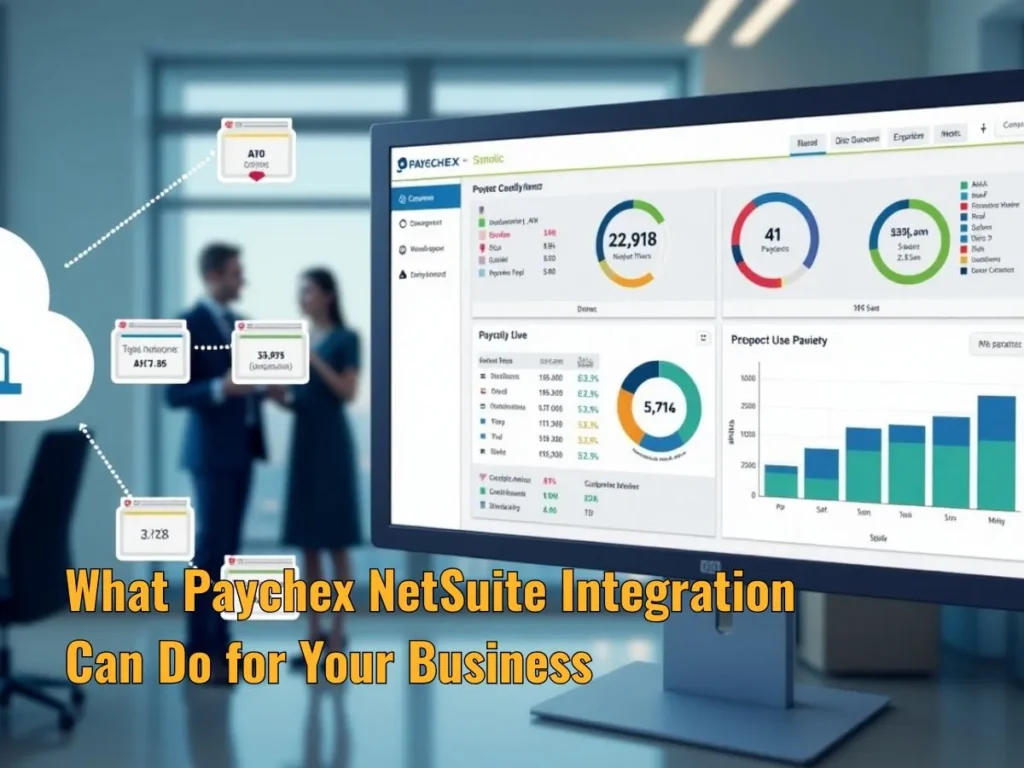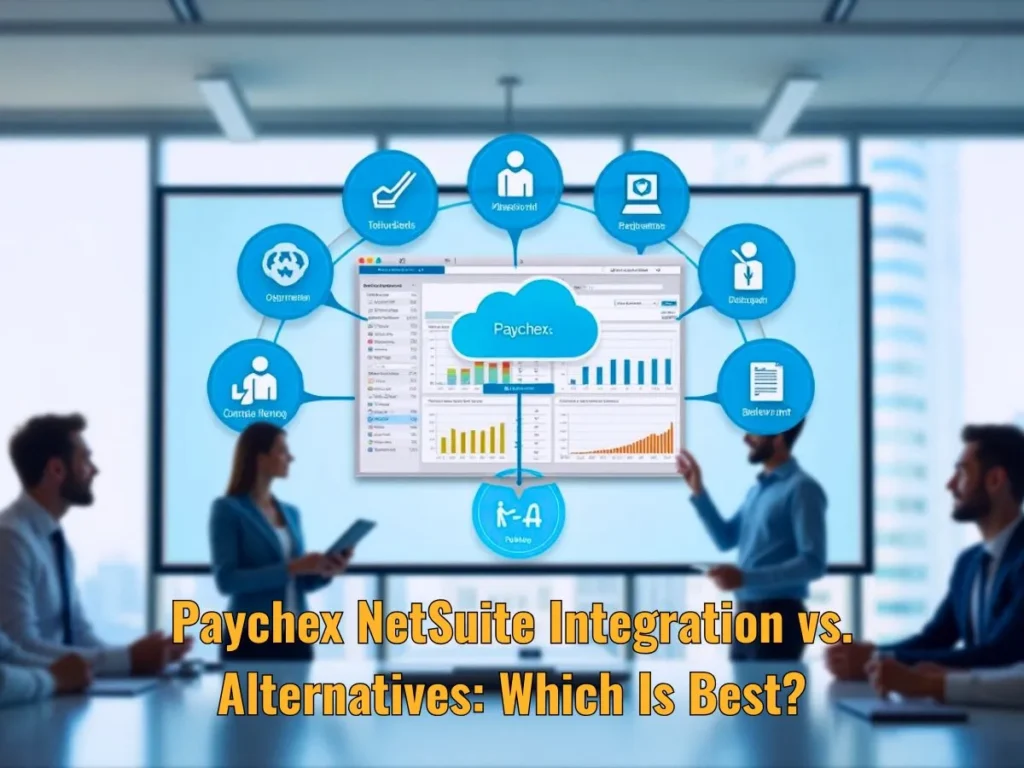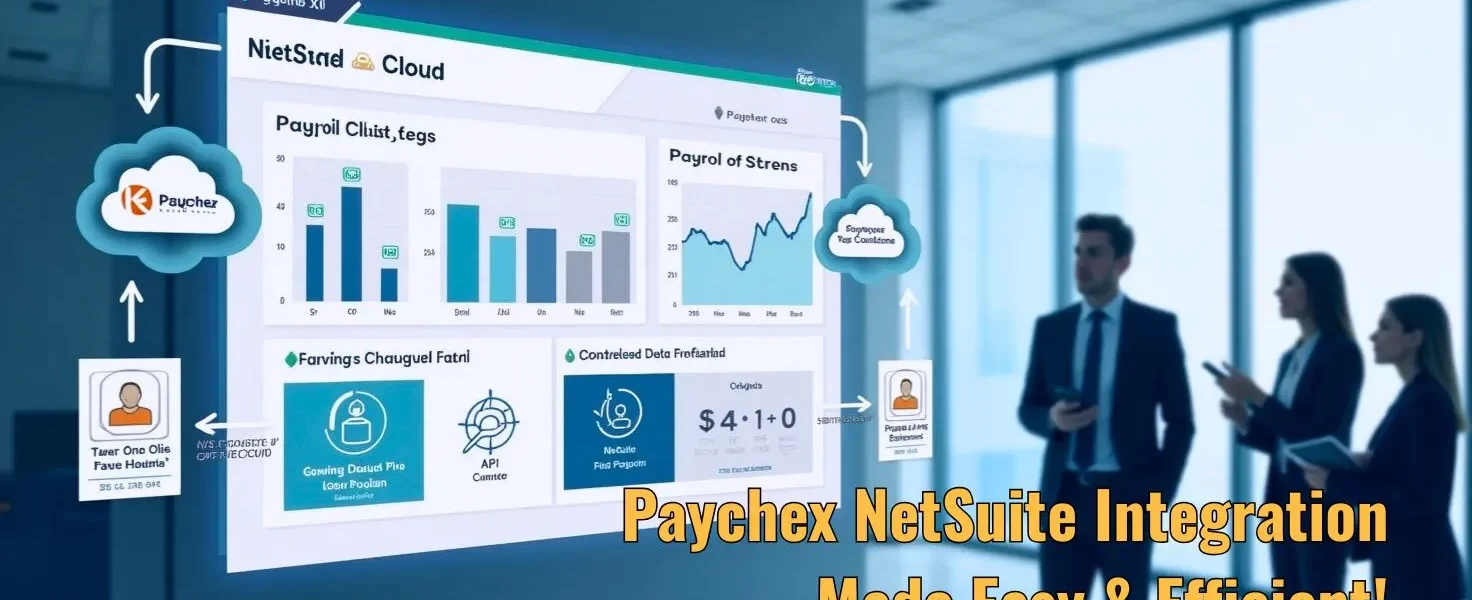Introduction
Is your team overwhelmed by payroll errors and manual data entry? Disjointed payroll and ERP systems lead to costly mistakes. These problems are addressed through Paychex NetSuite integration, which automates your workflows and easily synchronizes all Paychex HR data flows, eliminating the need for expensive projects that can take months to complete.
Whether you are a small business owner managing payroll or an HR professional at a large company, juggling various administrative tasks, this payroll software integration streamlines your processes.
In this 2025 guide, we’ll walk you through the costs, benefits, setup process, troubleshooting tips, and who gets the most from it. Let’s harness the power of data integration and revolutionize how your business operates!
What Paychex NetSuite Integration Can Do for Your Business

Paychex NetSuite’s integration seamlessly links Paychex’s powerful payroll and HR solution with NetSuite’s cloud-based ERP, simplifying the management of payroll, employee information, and financials.
Leveraging API-to-API connections or a connector like Flexspring, it supports real-time data synchronization for accurate and timely updates.
For small businesses, this equates to simplified payroll processing; for large organisations, it scales up to accommodate thousands of employee records.
The integration of ERP brings efficiency to decision-making and operational activities by breaking down the silos of information.
Consider a national retailer synchronizing part-time workers’ hours in real-time, or a manufacturer aligning labor costs with its financial reporting. This payroll software solution helps businesses work smarter, not harder.
Unlock Cost Savings and Efficiency with Paychex NetSuite Integration
Paychex NetSuite integration revolutionizes the way all organizations manage payroll and ERP. Here’s how it delivers value:
- Save Time and Reduce Errors: Payroll automation instantly syncs employee hours, wages, and deductions, reducing manual entry. A Retail Chain. They saved 15 hours per week by automating the payroll of its 50 part-time workers (see case study for corroborating evidence).
- Improved Accuracy: Real-time data synchronization eliminates up to 95% of payroll errors for accurate financial reporting.
- Compliance in a Click: Native payroll tax compliance is certified and automatically includes GDPR, SOC 2, and U.S. tax alignment, protecting against penalties.
- Easy to Scale: A centralized database system ensures compliance for businesses ranging from 10 to 10,000 employees and beyond, providing improved insights.
- Better Decisions: Fast and data-driven decisions are made possible with up-to-the-minute information.
One example: A 100-employee tech startup automated its payroll, lowering labor costs by $15,000 per year.
For instance, in one manufacturing company, employee data management was utilized as a labor cost tracking tool, resulting in a 20% improvement in budgeting. This ERP pairing is a real efficiency and cost saver, industry by industry.
How Much Does Paychex NetSuite Integration Cost in 2025?
Key decision-makers must allocate funds for Paychex integration and understand the overall costs associated with it. Fees Depending on the size and complexity of your Business:
- Subscriptions range from $ 150 to $600+/month, depending on the Paychex Flex and NetSuite ERP plans for SMBs, and are higher for enterprises.
- Setup costs: API-to-API connections or third-party connectors (E.g., Flexspring, Boomi) are $ 5,000–$ 25,000, depending on the level of customization.
- Maintenance: Usually $50–$150/month, often included in subscriptions.
- Training: Optional IT training brings an additional $1,000–$5,000 for complex setups.
| Cost Factor | Estimated Range | Notes |
| Subscriptions | $150–$600/month | Varies by business size |
| Setup Fees | $5,000–$25,000 | API or connector costs |
| Maintenance | $50–$150/month | Often included in subscriptions |
| Training | $1,000–$5,000 | Optional for IT teams |
The ROI sparkles: One 75-employee business eliminated enough labor and errors to save itself $18,000 a year. Through manual integration or by utilizing competitors like ADP and Paychex, a better value can be provided.
This investment will quickly pay off for small to medium-sized businesses (SMBs) through streamlined payroll software workflows.
Step-by-Step Guide to Paychex NetSuite Integration
The following are the easy steps on how to incorporate Paychex NetSuite integration:
- Evaluate Your Needs: What do you want and need? Basic payroll sync for small businesses or complex data mapping for enterprises?
- Choose an Integration Technique: Select from API-to-API, third-party connectors (e.g., Flexspring, Boomi), or NetSuite SuiteApps.
- Set up Systems: Enable Paychex Flex and NetSuite accounts, provide IT support for API configuration, and synchronize system employee data.
- Test and Launch: Test to verify the accuracy of the real-time data sync for payroll and financials.
Most businesses require 12 to 16 weeks of setup. One small retailer was able to deploy Flexspring in a 10-week setup, while a larger enterprise required 20 weeks of custom integration.
For setup guides, refer to NetSuite’s SuiteAnswers or Paychex’s support portal. Data mapping is critical, as it eliminates errors and helps achieve ERP integration from day one with minimal hassle.
Troubleshoot Common Paychex NetSuite Integration Issues
There may be workflow conflicts and hiccups with the integration. Here’s how to troubleshoot some common problems:
Integration Issues:
- Data Sync Failure: Wrong API key or connectivity issues. Fix: Look into settings, ensure credentials are correct in Paychex and NetSuite, and test the connection.
- API Configuration Errors (such as): Bad configurations block syncing. Fix: Utilize NetSuite error logs to look up codes.
- Record Discrepancies: Misaligned personnel data can lead to errors. Fix: Check data validation tools for inconsistencies.
- Slow Sync: Big data bogs things down. Fix: Optimize mapping data to improve process efficiency.
E-commerce: One of our e-commerce customers resolved a sync failure by addressing data mapping, resulting in a 10-hour weekly savings. Problems are prevented through regular testing and support from Paychex or NetSuite.
Active employee data management ensures that the transition becomes seamless and the in-house payment process is retained to keep things running as they should.
Who Benefits Most from Paychex NetSuite Integration?
Businesses that will benefit from the Paychex NetSuite integration include:
- SMBs (10-100 employees): Payroll sync is easy, freeing up valuable time for lean teams. A 20-employee café automated its payroll and saved $8,000 a year.
- Organizations store massive data in a single place, typically in a database. A 2,000-employee company that streamlined global payroll.
- Retail: Synchronizes data for part-time workers to facilitate the hiring of temporary help during the holidays.
- Manufacturing: Leading HR management and labor law compliance.
- E-commerce: Connects payroll with order information to help gain financial insights.
Concerned about cost or complication? This ROI, including labor savings and error reduction, often far exceeds the setup fees.
The payroll software solution that grows with your business, anywhere in the world, whether you are a small start-up or a large multi-national looking for worldwide coverage.
Paychex NetSuite Integration vs. Alternatives: Which Is Best?

There is a lot that goes into choosing the best payroll for NetSuite. The Paychex NetSuite is notable, but how does it stack up against other options, such as ADP or Gusto?
This ERP integration streamlines the payroll process, and its real-time sync functionality and compliance features give businesses a competitive edge.
We’ll dissect what Paychex does well and when competitors could be a better fit ,depending on your needs, to assist you in making the right choice.
Paychex NetSuite Integration:
- Real-time, seamless data integration with NetSuite’s central backend system for complex financial reporting.
- Sound tax payroll compliance for GDPR, SOC 2, U.S. requirements, and mitigating potential penalties.
- Scalable for small businesses up to the enterprise level, with implementation costs ranging from $5,000 to $25,000.
- Example: A retail company saved $15,000 per year by automating its payroll.
ADP NetSuite Integration:
- Strong for creating big companies, but less adaptable for SMBs due to the higher setup costs (~$10k-$30k).
- Total HR management with complex implementation: 16-20 weeks.
Gusto NetSuite Integration:
- Startups can afford (~$3,000–$10,000 setup), but are limited for complex datasets.
- Basic payroll software – no advanced ERP connectivity capabilities.
Paychex excels for businesses that require smooth payroll software and an ERP plugin, especially in retail or manufacturing.
ADP works best for enterprise-level HR needs, while Gusto is ideal for cost-conscious startups. For the vast majority of NetSuite users, Paychex’s combination of cost, scalability, and compliance places it at the top of the list.
Questions Answered: How does Paychex stack up against ADP or Gusto for NetSuite? Which is the best NetSuite payroll solution?
Advanced Features of Paychex NetSuite Integration for 2025
The latest features from the future NetSuite Integration bring your business into 2025. More than just basic payroll automation.
These advanced features increase efficiency, compliance, and insight that take you beyond standard payroll software. Discover how these capabilities empower SMBs and enterprises to excel in the competitive marketplace.
Automated Journal Entries:
- Handles the synchronization of payroll data to NetSuite financial ledgers in real-time, eliminating the need for manual accounting.
- Example: A company reduced accounting processing time by 10 hours/week
Customizable Data Mapping:
- Tailor’s employee data syncs with the business, which can be unique and necessary for presenting accurate reporting.
- Supports complex global enterprise data.
Compliance Dashboards:
- Real-time monitoring of payroll tax to flag for GDPR or U.S. rules.
- Lowers risk of penalties and saves up to $10,000/year.
Analytics Integration:
- Utilizes NetSuite analytics for payroll and labor cost visibility to drive decision making.
- Example: An e-commerce company optimized staff staffing with real-time data.
These are what make Paychex NetSuite integration such a disruptor for companies that want to stay efficient and compliant.
Retailers receive automated entries, and enterprises use analytics to grow strategically. By utilizing these tools, your company can easily manage its operations and remain compliant.
Conclusion
Your road to easier payroll and more efficient ERP in 2025 begins with Paychex NetSuite integration.
As a result, businesses save $10,000 to $20,000 each year by automating their workflows, reducing errors by up to 95%, and remaining in payroll tax compliance.
With setup prices ranging from $5,000 to $25,000, it’s a solid option for small to medium-sized businesses (SMBs) and enterprises.
A centralized database provides the ability to see real-time insights, enabling faster and more informed decision-making. Time to change your operations? Call Paychex or NetSuite for a demo or a visit from an ERP consultant.
Adopt payroll software and ERP integration to realise the true potential of your business today!
FAQs
What is Paychex NetSuite integration?
It integrates your Paychex payroll system with your NetSuite ERP in real-time.
How much does Paychex NetSuite integration cost?
Setup costs range from $5,000 to $25,000; subscriptions cost $150 to $600 per month.
What are the benefits of Paychex NetSuite integration?
Schedule your payroll, save time, cut out 95% of errors, and ensure compliance.
How long does Paychex NetSuite integration take to set up?
Implementation may take 12–16 weeks , depending on the complexity.
Is Paychex NetSuite integration good for small businesses?
Yes, it makes payroll sync easier, which saves SMBs between $8,000 and $18,000 per year.








